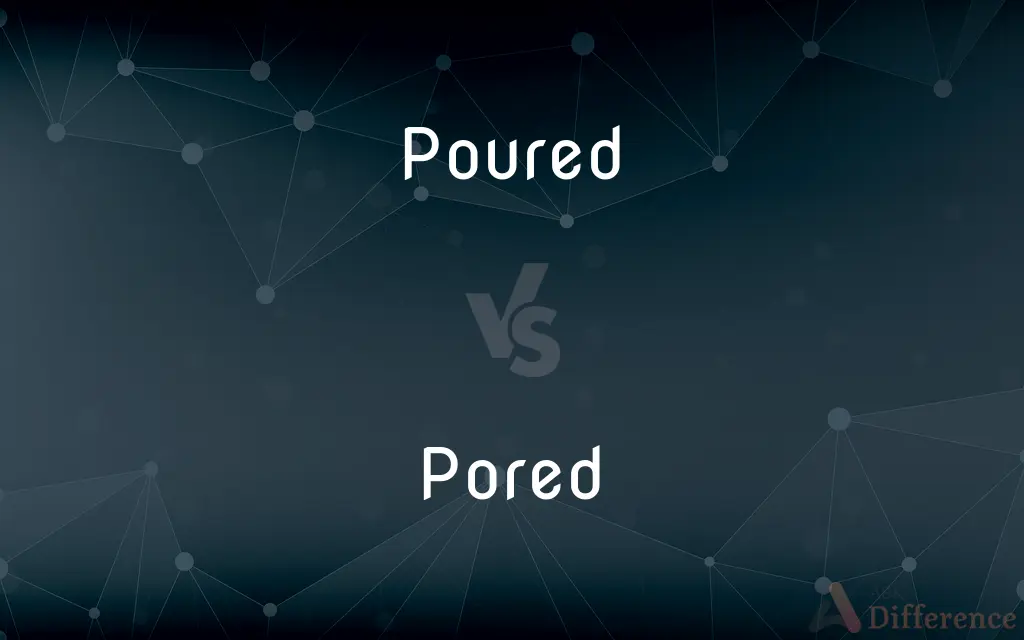Poured vs. Pored — What's the Difference?
By Tayyaba Rehman & Fiza Rafique — Updated on April 17, 2024
Poured involves transferring a liquid from one container to another, typically using gravity; pored refers to closely examining or studying something intently.

Difference Between Poured and Pored
Table of Contents
ADVERTISEMENT
Key Differences
"Poured" is primarily used to describe the action of causing a liquid to flow in a steady stream from or into a container, such as pouring water from a jug. On the other hand, "pored" is used when someone focuses intensely on reading or studying something, paying meticulous attention to details.
While pouring is a physical action often observed in everyday tasks like cooking or serving drinks, pored is a verb that indicates a mental activity, requiring concentration and attention to text or minute details.
Poured can also be used metaphorically to describe things other than liquids, such as light pouring through a window, whereas pored over is almost exclusively used in the context of careful examination of documents or materials.
When discussing pouring, the context is usually clear that there is a transfer or movement of a substance, often without any implication of careful handling or detailed scrutiny. On the other hand, when someone has pored over something, it suggests an investment of time and intellectual energy.
In everyday language, "poured" might also colloquially refer to large quantities or intensities, such as "poured effort into a project," emphasizing the act of giving or investing liberally. Conversely, "pored over" subtly underscores the depth rather than the breadth of attention, focusing on thoroughness and detail.
ADVERTISEMENT
Comparison Chart
Primary Meaning
To flow or cause to flow
To study or examine closely
Usage Context
Physical movement of liquids
Intellectual examination
Metaphorical Usage
Yes, broader applications
Limited to intense scrutiny
Typical Subjects
Liquids, light, effort
Books, documents, small objects
Example of Use
"She poured the tea."
"He pored over the ancient text."
Compare with Definitions
Poured
To be supplied or produced abundantly.
The sunlight poured through the windows.
Pored
To read or study with steady attention and in detail.
She pored over her textbooks the night before the exam.
Poured
To cause (liquid) to flow from a container.
He poured the water into the glass.
Pored
To gaze intently or fixedly.
He pored over the map looking for the hidden treasure.
Poured
To direct or cast (something) profusely or non-stop.
She poured her emotions into the letter.
Pored
To examine or explore thoroughly.
Scientists pored over the data from the experiment.
Poured
To flow or fall in streams.
Rain poured down all afternoon.
Pored
To be absorbed in the reading or study of.
They pored over the chess problem for hours.
Poured
To move or come in large numbers; stream.
Fans poured into the concert hall.
Pored
To scrutinize something.
She pored over the contract to find any discrepancies.
Poured
To cause (a liquid or granular solid) to stream or flow, as from a container
Poured tea from the pot into the cup.
Pored
To read, study, or examine something carefully and attentively
Pored over the documents in search of evidence.
Poured
To pour a liquid or particles into (a container)
Poured a glass of milk.
Pored
To meditate deeply; ponder
Pored on the matter.
Poured
To empty (a container) of a liquid or granular solid
Poured a bucket of sand on the ground.
Pored
(Archaic) To gaze intently; stare.
Poured
To send forth, produce, express, or utter copiously, as if in a stream or flood
Poured money into the project.
Poured out my inner thoughts.
Pored
Simple past tense and past participle of pore
Poured
To stream or flow continuously or profusely
Water poured over the dam.
Pored
Having or furnished with pores
Poured
To rain hard or heavily
It has been pouring for an hour.
Poured
To pass or proceed in large numbers or quantity
Students poured into the auditorium.
Poured
To serve a beverage, such as tea or coffee, to a gathering
We need someone to pour.
Poured
A pouring or flowing forth, especially a downpour of rain.
Poured
Simple past tense and past participle of pour
Common Curiosities
What does it mean to have "pored over" a book?
To pore over a book means to study or read it with very close attention to detail.
What does "poured" mean in a culinary context?
In cooking, poured typically refers to transferring liquid ingredients from one container to another.
Can "poured" and "pored" be used interchangeably?
No, "poured" and "pored" are not interchangeable as they pertain to very different actions and contexts.
What does "pored" suggest about someone’s focus?
"Pored" suggests a deep, intense, and focused examination, typically involving mental effort.
Is "poured" related to speed or style of movement?
Yes, "poured" often implies a smooth, flowing movement and is sometimes associated with speed, as in pouring rain.
Can "poured" be used figuratively?
Yes, "poured" can be used figuratively to describe an abundant or continuous transfer or output, such as effort or emotions.
What is a common mistake made with "poured" and "pored"?
A common mistake is confusing "poured" for "pored" when discussing detailed examination or study.
What does "poured out" imply?
"Poured out" can imply a generous or emotional outpouring, often used metaphorically.
What does it mean when someone has "never pored over" something?
It means they have never closely examined or deeply studied the particular thing.
Is "pored" ever used in a physical sense?
No, "pored" is not typically used to describe physical actions; it’s related to mental activities involving concentration.
How does "pored" relate to academic or professional activities?
"Pored" is often used in contexts requiring deep attention to detail, such as academic research or data analysis.
In what scenario might you use "poured"?
You might use "poured" when describing actions in cooking, bartending, or any scenario involving the transfer of liquids.
What is an example of pored being used in everyday conversation?
"I spent all morning poring over my notes for the presentation."
Why is understanding the difference between "poured" and "pored" important?
Knowing the difference helps in accurate communication, especially in written English, preventing misunderstandings.
Can "poured" refer to non-liquid substances?
Yes, metaphorically, "poured" can refer to substances or abstract concepts like light or effort.
Share Your Discovery

Previous Comparison
Escape vs. Skip
Next Comparison
Dragon vs. DemonAuthor Spotlight
Written by
Tayyaba RehmanTayyaba Rehman is a distinguished writer, currently serving as a primary contributor to askdifference.com. As a researcher in semantics and etymology, Tayyaba's passion for the complexity of languages and their distinctions has found a perfect home on the platform. Tayyaba delves into the intricacies of language, distinguishing between commonly confused words and phrases, thereby providing clarity for readers worldwide.
Co-written by
Fiza RafiqueFiza Rafique is a skilled content writer at AskDifference.com, where she meticulously refines and enhances written pieces. Drawing from her vast editorial expertise, Fiza ensures clarity, accuracy, and precision in every article. Passionate about language, she continually seeks to elevate the quality of content for readers worldwide.
















































